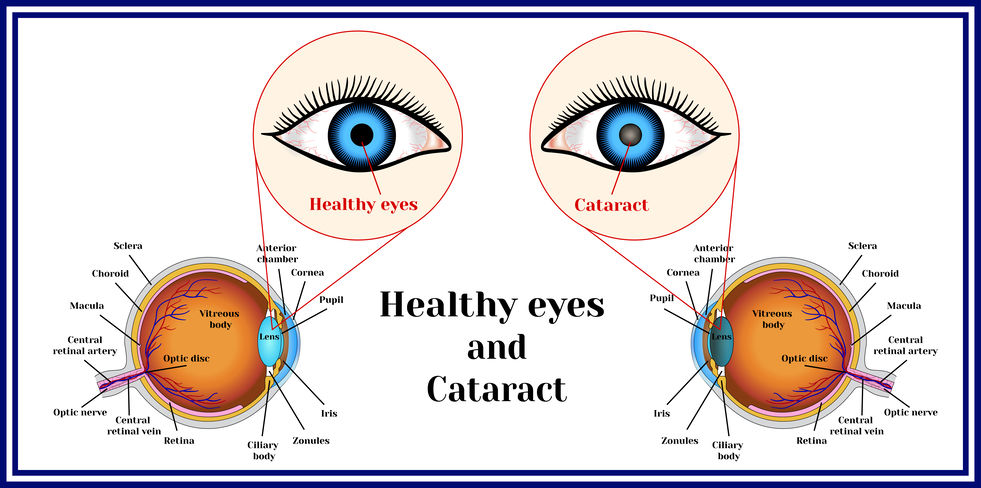A cataract is a clouding of the lens in your eye that, sadly, is an inevitable consequence of getting older. Cataracts usually occur when normal proteins in the lens of the eye break down and clump together, clouding the lens. Because the lens is no longer as clear as it should be, rather than following a usual path, incoming light is scattered. The cataract or cloudy lens blocks the passage of light to the retina in the back of the eye, causing distorted or blurred vision, issues with glare and difficulty handling bright light .
Basically, a cataract is a progressive, painless loss of vision and the leading cause of blindness worldwide. Cataracts start small and initially may have little effect on your vision. Things might just seem a little unclear. But as they grow, cataracts cloud more of the eye lens and distort more incoming light.
Cataract causes and preventions
Although cataracts are not completely preventable, and cataracts develop in most of us as we age, their onset can be delayed. How? The simplest and most effective way to protect your eyes against cataracts is to stay out of the sun. Wear a wide-brimmed hat and tinted glasses or sunglasses with a UV filter to protect eyes from harmful UV rays.
What else you can do to prevent or reduce the risk of cataracts:
- if you have diabetes, ensure blood sugar levels are well controlled
- don’t smoke
- avoid excess alcohol
- get enough vitamin C, vitamin A, and carotenoids, found in leafy green vegetables such as kale and spinach
- get regular eye examinations.
What visual changes do cataracts cause?
Cataract symptoms include increasing difficulty seeing well at night – especially when facing oncoming car headlights – having to make the text on your phone even larger and sensing that colors are fading. Over time as details become less clear, you may find it difficult to read, watch television, see food on a plate and judge distances accurately. Driving and physical maneuverability can become common safety issues.
Some people with cataracts describe life as being like looking through a window streaked with dirt.
However, because age-related cataracts generally develop over time, gradually worsening vision may not be noticeable. Without regular eye tests, people often wait, sometimes too long, to do something about them.
Are you suffering from
- double vision
- clouded or blurred vision
- colors appearing dull and without vibrancy
- difficultly with driving, especially at night because of the glare and halo appearing around lights
- the need got brighter light when reading
- frequent changes in glasses or contact lens prescriptions
- headaches?
It might be time for action. If vision problems are affecting your day to day life, consider seeing one of our Auckland optometrists to discuss your options. Cataracts can be fixed!
Worried? See our Auckland optometrists!
You may well have cataract-like symptoms, but those symptoms could also be signs of other eye-related problems. It is always a good idea to see an optometrist if you are experiencing any changes in your vision.
We can give you a thorough eye check. If caught early, most eye conditions can be helped.
What is a cataract? To get all your questions answers call 09 522 1283 to speak to our Newmarket optometrists. To speak to an optometrist in Henderson call 09 836 1731.

